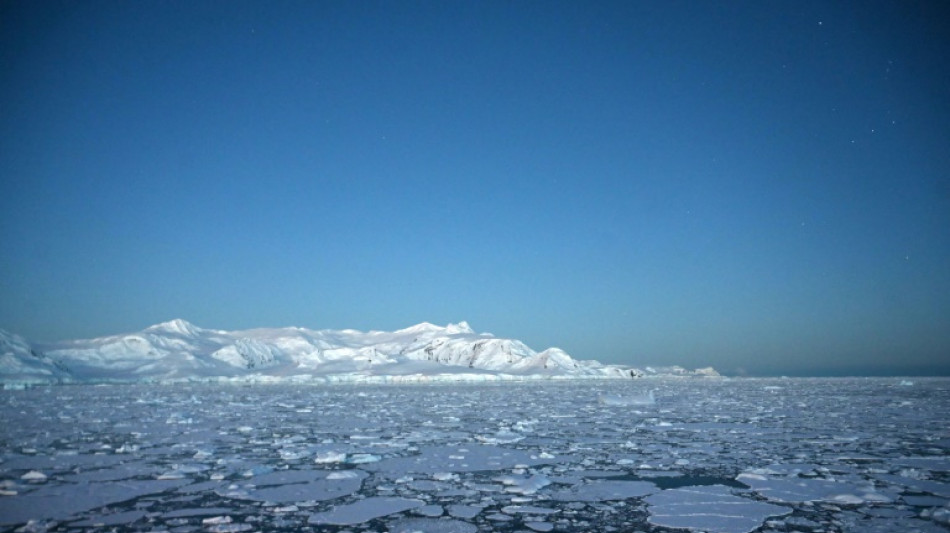
-
 Japan PM's tax giveaway roils markets and worries voters
Japan PM's tax giveaway roils markets and worries voters
-
Amid Ukraine war fallout, fearful Chechen women seek escape route

-
 Rybakina surges into Melbourne semis as Djokovic takes centre stage
Rybakina surges into Melbourne semis as Djokovic takes centre stage
-
Dollar struggles to recover from losses after Trump comments

-
 Greenland blues to Delhi red carpet: EU finds solace in India
Greenland blues to Delhi red carpet: EU finds solace in India
-
Will the EU ban social media for children in 2026?

-
 Netherlands faces 'test case' climate verdict over Caribbean island
Netherlands faces 'test case' climate verdict over Caribbean island
-
Rybakina stuns Swiatek to reach Australian Open semi-finals

-
 US ouster of Maduro nightmare scenario for Kim: N. Korean ex-diplomat
US ouster of Maduro nightmare scenario for Kim: N. Korean ex-diplomat
-
Svitolina credits mental health break for reaching Melbourne semis

-
 Japan's Olympic ice icons inspire new skating generation
Japan's Olympic ice icons inspire new skating generation
-
Safe nowhere: massacre at Mexico football field sows despair

-
 North Korea to soon unveil 'next-stage' nuclear plans, Kim says
North Korea to soon unveil 'next-stage' nuclear plans, Kim says
-
French ex-senator found guilty of drugging lawmaker

-
 US Fed set to pause rate cuts as it defies Trump pressure
US Fed set to pause rate cuts as it defies Trump pressure
-
Sleeping with one eye open: Venezuelans reel from US strikes

-
 Venezuela's acting president says US unfreezing sanctioned funds
Venezuela's acting president says US unfreezing sanctioned funds
-
KPop Demon Hunters star to open Women's Asian Cup

-
 Trump warns of 'bad things' if Republicans lose midterms
Trump warns of 'bad things' if Republicans lose midterms
-
Russian strikes in Ukraine kill 12, target passenger train

-
 With Maduro gone, Venezuelan opposition figure gets back to work
With Maduro gone, Venezuelan opposition figure gets back to work
-
Celebrities call for action against US immigration raids

-
 Rubio to warn Venezuela leader of Maduro's fate if defiant
Rubio to warn Venezuela leader of Maduro's fate if defiant
-
Denver QB Nix 'predisposed' to ankle injury says coach

-
 Lula, Macron push for stronger UN to face Trump 'Board of Peace'
Lula, Macron push for stronger UN to face Trump 'Board of Peace'
-
Prass stunner helps Hoffenheim go third, Leipzig held at Pauli

-
 Swiss Meillard wins final giant slalom before Olympics
Swiss Meillard wins final giant slalom before Olympics
-
CERN chief upbeat on funding for new particle collider

-
 Trump warns US to end support for Iraq if Maliki returns
Trump warns US to end support for Iraq if Maliki returns
-
Judge reopens sexual assault case against goth rocker Marilyn Manson

-
 South Korea's ex-first lady to learn verdict in corruption case
South Korea's ex-first lady to learn verdict in corruption case
-
Rosenior dismisses Chelsea exit for 'untouchable' Palmer

-
 Markram powers South Africa to win over West Indies
Markram powers South Africa to win over West Indies
-
Vladimir Padrino: Venezuela's military power broker

-
 Amazon closing Fresh and Go stores in Whole Foods push
Amazon closing Fresh and Go stores in Whole Foods push
-
Koepka nervous about game and fans in PGA Tour return

-
 Trump's Iowa trip on economy overshadowed by immigration row
Trump's Iowa trip on economy overshadowed by immigration row
-
Dortmund coach says Inter Milan are improved under Chivu

-
 US border chief in Minneapolis as Trump tries to calm crisis
US border chief in Minneapolis as Trump tries to calm crisis
-
What to know about America's colossal winter storm

-
 Iran warns against 'instability' after US strike group arrives
Iran warns against 'instability' after US strike group arrives
-
GM reports quarterly loss but boosts shareholder returns

-
 US banks fight crypto's push into Main Street
US banks fight crypto's push into Main Street
-
NFL Bills make offensive coordinator Brady new head coach

-
 TikTok settles hours before landmark social media addiction trial
TikTok settles hours before landmark social media addiction trial
-
Newcastle braced for 'ultimate test' against PSG after storm disruption

-
 Brook blitz ends Sri Lanka's unbeaten home run, England clinch series
Brook blitz ends Sri Lanka's unbeaten home run, England clinch series
-
LVMH 2025 net profit drops 13% to 10.9 bn euros

-
 Philip Glass pulls Kennedy Center premiere after Trump takeover
Philip Glass pulls Kennedy Center premiere after Trump takeover
-
Slot says Liverpool must fix 'very bad cocktail'


Record low Antarctic sea ice extent could signal shift
Sea ice around Antarctica shrank to the smallest extent on record in February, five years after the previous record low, researchers said Tuesday, suggesting Earth's frozen continent may be less impervious to climate change than thought.
In late February, the ocean area covered by ice slipped below the symbolic barrier of two million square kilometres (around 772,000 square miles) for the first time since satellite records began in 1978, according to a study in the journal Advances in Atmospheric Sciences.
Researchers found that the key driver of ice loss was change in temperature, though shifts in ice mass also played a lesser role.
Both the North and South pole regions have warmed by roughly three degrees Celsius compared to late 19th-century levels, three times the global average.
Antarctica encountered its first recorded heatwave in 2020, with an unprecedented 9.2C above the mean maximum, and in March a research centre in eastern Antarctica saw temperatures soar 30 degrees above normal.
But extreme aberrations of this kind are recent.
Unlike sea ice in the Arctic, which has diminished by three percent a year since the late 1970s, sea ice in Antarctica expanded over the same period by one percent per decade, albeit with large annual variations.
Ice cover during this year's austral summer shrank most around West Antarctica, which has been more vulnerable to global warming than the far larger East Antarctica.
- Sea-ice budget -
Melting sea ice has no discernable impact on sea levels because the ice is already in ocean water.
But diminished ice cover is nonetheless a major concern because it helps accelerate global warming, explained co-author Qinghua Yang, a professor at Sun Yat-sen University in Guangzhou.
When white sea ice -- which bounces the Sun's energy back into space -- is replaced by dark, unfrozen sea, "there is less reflection of heat and more absorption," he said in a statement.
"This in turn melts more sea ice, producing more absorption of heat, in a vicious circle."
Pristine snow and ice reflect more than 80 percent of the Sun's energy back into space whereas open ocean absorb the same percentage.
Startlingly, the record low 1.9 million square kilometres on February 25 was 30 percent below the 1981-2010 average. The previous record was just over two million square kilometres in 2017.
Maximum sea ice extent in Antarctica has averaged about 18 million square kilometres in recent years.
To analyse the causes of this year's record ice loss, researchers examined Antarctica's "sea-ice budget" -- ice added and ice lost, year by year -- as well as daily sea-ice drift, or movement.
"In summer, thermodynamic" -- or temperature-related -- "processes dominate the sea melting through poleward heat transport," the study concluded.
The record minimum sea ice extent in the Arctic -- 3.4 million square kilometres -- occurred in 2012, with the 2nd and 3rd lowest ice-covered areas in 2020 and 2019, respectively. Maximum sea ice extent has averaged about 15 million square kilometres.
Ice sheets atop West Antarctica hold the equivalent of six metres of sea level rise, where as East Antarctica's massive glaciers would raise global oceans by more than 50 metres.
S.Keller--BTB




